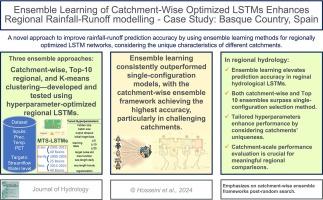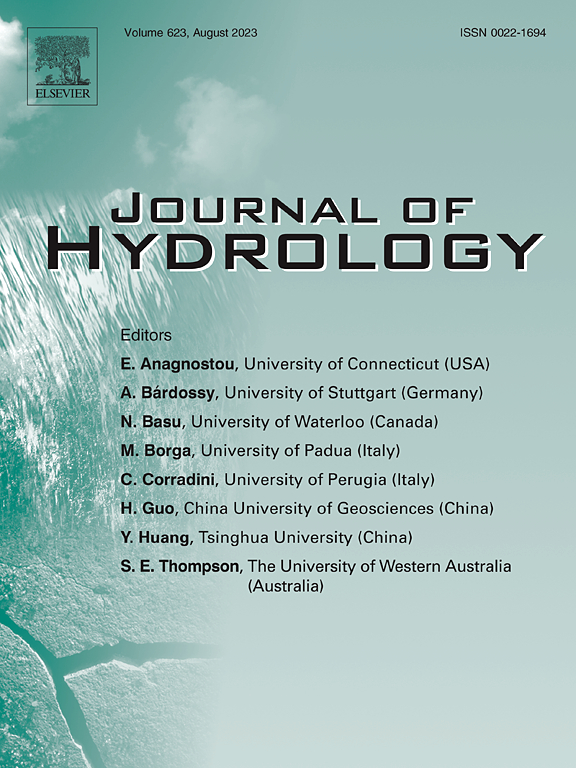集水区优化 LSTM 的集合学习增强区域降雨-径流建模 - 案例研究:西班牙巴斯克地区
IF 5.9
1区 地球科学
Q1 ENGINEERING, CIVIL
引用次数: 0
摘要
准确的降雨-径流建模对于有效的水资源管理和规划至关重要,尤其是在容易发生快速洪水的山洪集水区。本研究探讨了应用于区域优化深度学习模型(特别是长短期记忆(LSTM)网络)的集合学习方法的性能,以增强水文预测效果。在优化区域超参数设置的基础上,开发了三种集合方法:按流域、区域前十名和 K-means 聚类选定配置。对这些网络进行了训练,并将其在测试集上的模拟中值视为每个集合的最终预测值。然后根据观测数据对最终预测结果进行评估。我们的研究结果表明,在所有地点,特别是在具有预测复杂性或人为足迹的集水区,集合学习方法始终优于传统的单一配置方法(即选择最佳区域设置)。按集水区划分的集合表现出了最高的预测准确性和稳健性,突出了根据各个集水区的独特特征调整网络配置的重要性。研究结果凸显了集合学习在显著改善水文预测和为水资源管理提供更好的决策依据方面的潜力。具体来说,这项研究展示了集水区配置的集合学习如何克服深度学习模型在区域水文预测中的局限性,从而解决 "地方独特性 "范式的问题。本文章由计算机程序翻译,如有差异,请以英文原文为准。

Ensemble learning of catchment-wise optimized LSTMs enhances regional rainfall-runoff modelling − case Study: Basque Country, Spain
Accurate rainfall-runoff modeling is crucial for effective water resources management and planning, especially in flash catchments prone to rapid floods. This study investigates the performance of ensemble learning methods applied to regionally optimized deep learning models, specifically long short-term memory (LSTM) networks, for enhanced hydrological prediction. Three ensemble approaches were developed based on optimized regional hyperparameter settings: catchment-wise, top-10 regional, and K-means clustering selected configurations. These networks were trained, and the median of their simulations on the test set was considered the final prediction for each ensemble. The final predictions were then evaluated against observed data. Our findings show that ensemble learning methods consistently outperform conventional single-configuration approach of selecting the best regional setting in all locations, especially in catchments with prediction complexity or anthropogenic footprints. The catchment-wise ensemble demonstrated the highest prediction accuracy and robustness, highlighting the importance of tailoring network configurations to the unique characteristics of individual catchments. The findings highlight the potential of ensemble learning to significantly improve hydrological forecasts and inform better decision-making in water resources management. Specifically, this research demonstrates how ensemble learning of catchment-wise configurations can overcome limitations in regional hydrological predictions by deep learning models, addressing the “uniqueness of the place” paradigm.
求助全文
通过发布文献求助,成功后即可免费获取论文全文。
去求助
来源期刊

Journal of Hydrology
地学-地球科学综合
CiteScore
11.00
自引率
12.50%
发文量
1309
审稿时长
7.5 months
期刊介绍:
The Journal of Hydrology publishes original research papers and comprehensive reviews in all the subfields of the hydrological sciences including water based management and policy issues that impact on economics and society. These comprise, but are not limited to the physical, chemical, biogeochemical, stochastic and systems aspects of surface and groundwater hydrology, hydrometeorology and hydrogeology. Relevant topics incorporating the insights and methodologies of disciplines such as climatology, water resource systems, hydraulics, agrohydrology, geomorphology, soil science, instrumentation and remote sensing, civil and environmental engineering are included. Social science perspectives on hydrological problems such as resource and ecological economics, environmental sociology, psychology and behavioural science, management and policy analysis are also invited. Multi-and interdisciplinary analyses of hydrological problems are within scope. The science published in the Journal of Hydrology is relevant to catchment scales rather than exclusively to a local scale or site.
 求助内容:
求助内容: 应助结果提醒方式:
应助结果提醒方式:


